Masonry Adhesive
Masonry Adhesive: Strong Glue to Bond Brick, Stone, Concrete
Adiseal masonry adhesive provides a waterproof, flexible, durable & high-strength bond on brick, concrete, stone & other construction masonry materials. It is a heavy-duty adhesive that bonds in dry, damp or wet conditions and provides a durable water-resistant bond. It is ideal for both indoor or outdoor use and can withstand harsh weather conditions, making a great exterior adhesive for stone. Adiseal adhesive sealant has also been shown to be the strongest adhesive in an independent adhesive strength test.
- Why choose Adiseal masonry adhesive?
- What materials does it bond?
- What are the applications and benefits of Adiseal masonry adhesive?
- How to use a masonry adhesive?
- Glue for masonry
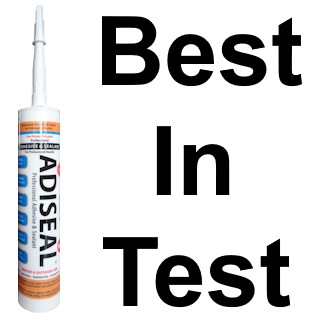
Why choose Adiseal masonry adhesive?
Adiseal is a high-performance masonry adhesive due to several reasons:
- Exceptional Bond Strength: Adiseal is known for its outstanding bond strength, creating a durable and long-lasting bond between masonry materials. It ensures a reliable connection that can withstand the stresses and loads encountered in construction and maintenance projects.
- Versatility: Adiseal is a versatile masonry construction adhesive suitable for various masonry applications. It can bond different types of masonry materials, including bricks, stones, blocks, and tiles. This versatility makes it a reliable choice for a wide range of projects.
- Weather Resistance: Adiseal exhibits excellent resistance to weather conditions, including moisture, rain, humidity, and temperature fluctuations. It maintains its bond integrity even in challenging environments, protecting the masonry structure from water damage and ensuring long-term performance, making it a great exterior grab adhesive.
- Flexibility and Movement Accommodation: Adiseal’s flexibility accommodates slight movements, expansions, and contractions in masonry structures, reducing the risk of cracks or bond failure and ensuring structural integrity.
- Easy Application: Adiseal is user-friendly and easy to apply using standard sealant guns (caulking guns) with cartridges. Its smooth consistency facilitates effortless spreading and positioning during application.
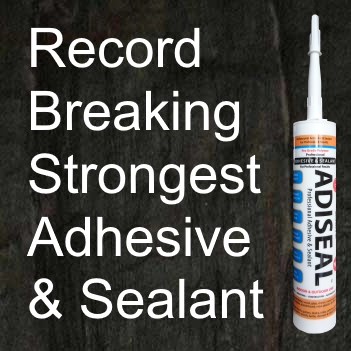
What materials does it bond?
Adiseal will successfully stick the following items:
- Wood
- Glass
- Stone
- Ceramic
- Rubber (natural)
- Metal like steel, copper, iron, brass, lead, aluminum and others.
- Synthetic Materials
- Leather
- Most Plastics
- Concrete
- Cement
- Travertine
- Fibreglass
- Fabric
- Granite
- Marble
- Brick
- Mirror
- Masonry
- Polystyrene
- Breeze block
- Many other items
What are the applications and benefits of Adiseal masonry adhesive?
Strongest adhesive
In an independent adhesive strength test conducted by Ultimate Handyman, Adiseal adhesive & sealant demonstrated over 3 times the strength of its closest competitor. The test had to be stopped as the screws holding the test rig began to rip out before Adiseal’s impressive adhesive bond broke. The chart below shows the results of the adhesive strength test, showing Adiseal as the strongest adhesive.
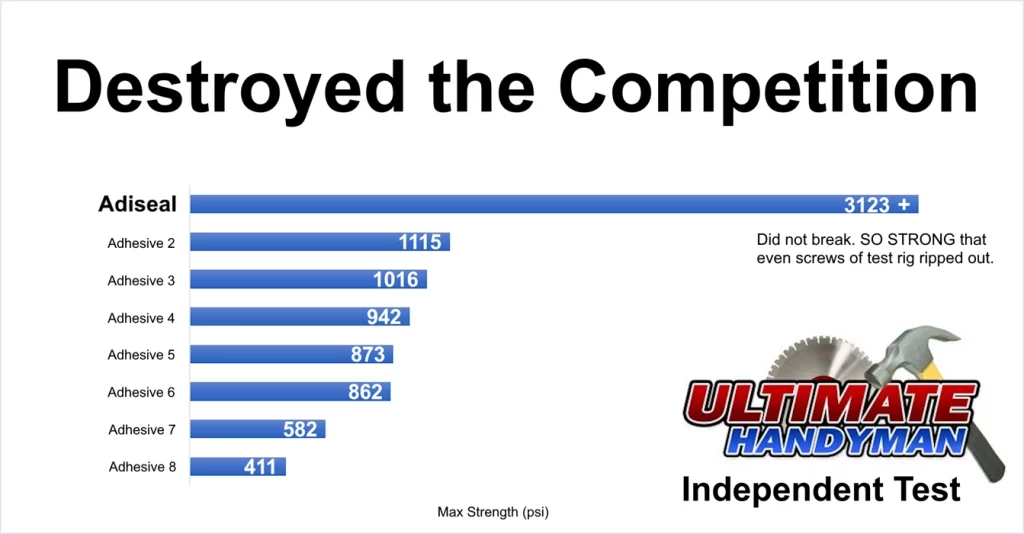
Best adhesive test results table
| Product | Max pressure when adhesive bond broke (psi) |
| Adiseal | 3123 + psi |
| SupaBond | 1115 psi |
| Tec 7 | 1016 psi |
| HB42 | 942 psi |
| Loctite PL Premium | 873 psi |
| Gorilla Grab Adhesive | 862 psi |
| Bond It PU18 | 582 psi |
| Bond It Save Nails | 411 psi |
“That is actually unbelievable!”
Ultimate Handyman
Testimonials
Testimonials & some comments on the: Grab adhesive tests 2017, video on YouTube
- That Adiseal is phenomenal!
- That Adiseal is some stuff though, definitely need to get some of that bought!
- I instantly went looking for Adiseal!
- Need to get my hands on some of that to try out.
- Looks like a cracking product.
- Having used the two most expensive brands on numerous occasions, I’ll be trying out the others, especially the Adiseal.
- Adiseal certainly surprised me in this test!
- Fantastic tests. It’s unbelievable that Adiseal test with the hardwood.
How to use a masonry adhesive
How to use a masonry adhesive
- Surface Preparation
Ensure that the surfaces to be bonded are clean, dry, and free from dust, debris, or any loose material. Use a wire brush or similar tool to remove any loose particles. Using a fine brush like a painting brush will help remove fine dust.
- Adhesive Application
Apply the masonry adhesive to one of the surfaces using the appropriate method. Covering more surface area with an adhesive can provide a better bond.
- Bonding Surfaces
Press the surfaces firmly together, ensuring proper alignment and contact. Apply sufficient pressure to create a strong bond. Adjust and reposition if necessary before the adhesive starts to set. Sliding the item side to side slightly can help spread the adhesive to cover more surface area.
- Temporary supports
Use temporary supports if the item does not stay in place until the adhesive has cured.
- Curing Time
Allow the adhesive to cure according to the manufacturer’s instructions. This typically involves a specified time for the adhesive to reach its full strength. Avoid disturbing or applying stress to the bonded surfaces during the curing process.
- Cleanup
Clean any excess adhesive immediately using a damp cloth or the recommended solvent, following the adhesive manufacturer’s instructions. It is easier to remove the adhesive before it fully cures.
Tip: To store Adiseal once opened, leave about 1cm worth of product out of the nozzle and store the tube upright in a cool dry place. Adiseal requires moisture for it to cure. The exposed part out of the nozzle will cure creating a cap. To re-use Adiseal, pull the cured part out or cut the nozzle until the uncured part is reached.
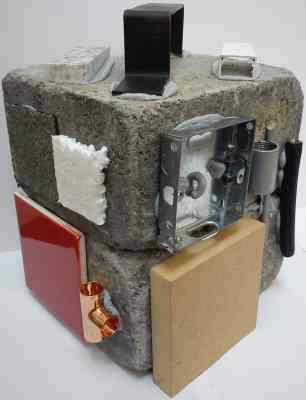
Colours
Adiseal adhesive and sealant is available in the following colours:
- White adhesive and white sealant
- Black adhesive and black sealant
- Grey adhesive and grey sealant
- Clear adhesive and clear sealant
- Brown adhesive and brown sealant
Adiseal can also be manufactured in any RAL colour.
Please note Adiseal adhesive sealant colours provide a stronger bond on brick, concrete or other materials compared to the clear version.
Masonry adhesive or masonary adhesive
“Masonry” is a term that is often misspelled as “masonary.” However, it is important to note that the correct spelling is masonry. The misspelling masonary may be a common error due to the similarity in pronunciation, but it is not the proper spelling of the word. Masonry refers to the construction or craft of building structures using bricks, stones, concrete blocks, or other similar materials. So when people are talking about masonary adhesive, what they actually mean is masonry adhesive.
Glue for masonry
Masonry glue is specially designed for robust and lasting bonds in tasks involving bricks, stones, concrete blocks, and similar materials. It’s often used in construction for tasks like securing masonry veneers, repairing cracks or gaps in masonry structures, and assembling masonry elements.
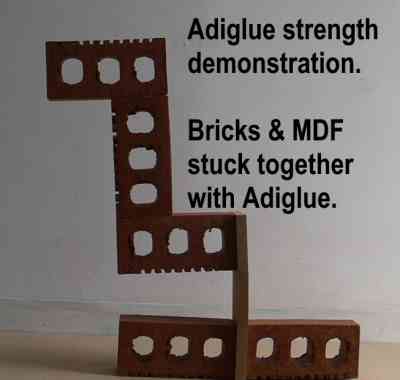
Masonry glue is designed to endure significant loads and stresses prevalent in masonry projects. Its weather-resistant properties guarantee reliable and enduring bonds, making it suitable for various outdoor applications.
To ensure effective bonding, it is vital to prepare surfaces by thoroughly cleaning them of dust, debris, and loose materials. Apply the glue evenly, ensuring adequate coverage. Press the masonry materials together, allowing the glue to bond and set. Curing times may vary based on the product and environmental conditions, so following the manufacturer’s instructions is crucial for optimal results.

Adiglue glue for masonry
When using Adiglue glue on masonry, to avoid the masonry soaking up the glue, seal the masonry first before applying the glue.
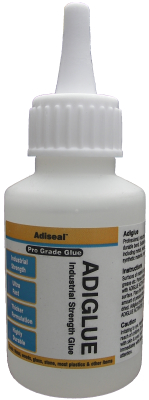
For most bonding applications is is advisable to use the Adiseal adhesive and sealant over the Adiglue product. Adiseal adhesive and sealant will provide a stronger, more flexible and more durable bond on masonry.
Mechanical fixings
It’s also possible to attach items to masonry with mechanical fixings by drilling masonry first. Our Adiseal Ultimate masonry drill bit & multi material drill bit drills faster than any other bit when drilling without hammer function on drill. It is suitable at drilling brick, drill concrete, wood, plastic and other building materials.
Where to buy masonry adhesive?
In the UK, to buy masonry adhesive, please contact us for details of your local stockist. For other countries visit www.guglue.com
Frequently asked questions about masonry adhesive
Masonry adhesive can be used in various applications, such as bricklaying, blockwork, stone veneer installation, concrete repair, anchoring bolts, setting stone countertops, and bonding precast concrete elements.
Yes, many masonry adhesives are designed to withstand outdoor conditions and are suitable for exterior applications. They offer resistance to weather elements, including moisture, rain, and temperature fluctuations.
Some types of masonry adhesive offer waterproof properties or resistance to moisture. However, it is important to check the product specifications and ensure that the adhesive is specifically labeled as waterproof if that is a requirement for your project.
Adiseal has been shown to be the strongest adhesive in an independent adhesive strength test. It finished over 3 times stronger than the next best adhesive.
Adiseal has been shown to be the strongest adhesive in an independent adhesive strength test. It is also waterproof, weatherproof, UV resistant and flexible, making it ideal for use outdoors. Adiseal provides a strong and durable bond outdoors.
Adiseal has been shown to be the strongest adhesive in an independent adhesive strength test. As well as the remarkable bond strength, Adiseal is also waterproof, flexible, UV resistant, solvent-free and highly durable.
Adiseal is the perfect choice for sticking wood to masonry. It provides a strong, flexible, waterproof and durable adhesive bond between wood to masonry. Adiseal will successfully bond wood to different types of masonry including brick, concrete and stone.
Adiseal has been shown to be the strongest adhesive in an independent adhesive strength test. Adiseal will glue masonry to many different materials and provide a high-strength, flexible, waterproof and durable bond when gluing masonry.
